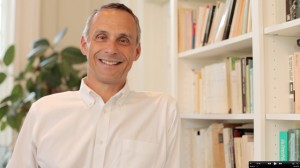Faculty to Teach Coursera Classes Starting Feb. 4

For alumni seeking to relive their days in the classroom, parents interested to see first-hand what their Wesleyan students are learning, and prospective students—or anyone else—curious about the Wesleyan experience, here’s your chance. Beginning Feb. 4, two Wesleyan professors—President Michael Roth and Associate Professor of Film Studies Scott Higgins—will open their virtual classrooms on Coursera.
In September 2012, Wesleyan announced a new partnership with Coursera, a company offering the public access to free MOOCs (massive open online courses) taught by professors from top colleges and universities. Wesleyan is the first liberal arts institution focused on the undergraduate experience to offer classes through Coursera. Since September, more than 130,000 people have enrolled in the six online classes that will be offered this year by Wesleyan professors.
Roth’s 14-week-long course, “The Modern and the Postmodern,” examines “how the idea of ‘the modern’ developed at the end of the 18th Century and how being modern (or progressive, or hip) became one of the crucial criteria for understanding and evaluating cultural change during the last 200 years. Are we still in modernity,” Roth asks on the course website, “or have we moved beyond the modern to the postmodern?” The class will consist of short video lectures, readings, quizzes, peer-graded writing assignments, and a final exam. Readings for the course include writing by Jean-Jacques Rousseau, Immanuel Kant, Karl Marx, Charles Darwin and Virginia Woolf, among others.
“Preparing the Coursera version of the course while teaching ‘The Modern and the Postmodern’ on campus has helped me to think anew about material I’ve been teaching for many years,” Roth said. “Even though my class at Wesleyan is pretty large, there are always student questions and spontaneous discussion. This, of course, isn’t available when one is just taping remarks. I had originally thought that taping my class on campus would work for the online version, but that isn’t the case. So, I tried to distill the core of the class into four 15-minute lecture segments each week. That helped me think about the material in a very focused way. Next time I teach the course at Wesleyan, I hope to use some of these videos so as to make it possible to have more discussions during the class sessions.”
Roth added that he’s eager to receive feedback on the course from the thousands of students who have enrolled. “It’s a ‘great books’ class, and there aren’t too many of those on Coursera,” he noted. “I wonder what the students will take away from the lectures and the forums. Perhaps alumni who sign up for the class will want to meet at Reunion or Homecoming to talk about the material. That would be exciting for me!”

Higgins’ course, “The Language of Hollywood: Storytelling, Sound and Color,” explores how fundamental changes in film technology—such as the introduction of color and the transition to sound—have affected Hollywood storytelling. The five-week course will consist of four weekly video lectures about 15 minutes in length. Students are also expected to see films covered in the class—including Monkey Business (1931), Scarface (1932), Adventures of Robin Hood (1938), All That Heaven Allows (1958) and Punch Drunk Love (2002)—on their own.
Reflecting on his preparations for the class, Higgins said, “This project has forced me to look seriously at my teaching and how I communicate. Watching yourself on video is always a horror show, but reworking these lectures for a new medium has helped me sift and refine my ideas. Moving from live lectures in a classroom to online isn’t a matter of simple translation, but reconceptualization and reshaping. It puts the material in a new light.”
Higgins’ course will encourage students to think about the craft of storytelling in historical terms. “I hope these lectures help sensitize viewers to the complexity and importance of film form. I always try to guide my students to think like filmmakers—to confront the specific choices in sound and image that create the cinematic experience. That is a big part of Wesleyan’s approach to film,” he said. In his Coursera class, Higgins tries recreate the classroom experience by walking students through film scenes and sequences bit by bit. “This isn’t a replacement for the classroom experience, but it is a taste of it that might lead some online students to go further on their own. It might also be a ‘refresher’ for anyone who misses the film classroom,” he said.

Higgins hopes that what he learns from teaching on Coursera can eventually feed back into his Wesleyan classroom. “I think I’ve sharpened some of my ideas just by inhabiting the student’s seat while watching my lectures. I’d be delighted if I could incorporate a few of these online lectures into class, maybe assign them as homework, so that we could spend more time in give-and-take discussion next time I teach this course at Wesleyan.”
Other MOOCs taught by Wesleyan professors will begin in the coming months. These include “Property and Liability: An Introduction to Law and Economics,” (begins March 18) by Richard Adelstein, the Woodhouse/Sysco Professor of Economics, chair of economics; “The Ancient Greeks,” (March 18) by Andrew Szegedy-Maszak, the Jane A. Seney Professor of Greek, professor of classical studies; “Passion Driven Statistics,” (March 25) by Lisa Dierker, professor of psychology; and “Social Psychology,” (July 8) by Scott Plous, professor of psychology.
Read more about Coursera in this September 2012 Wesleyan Connection story.

